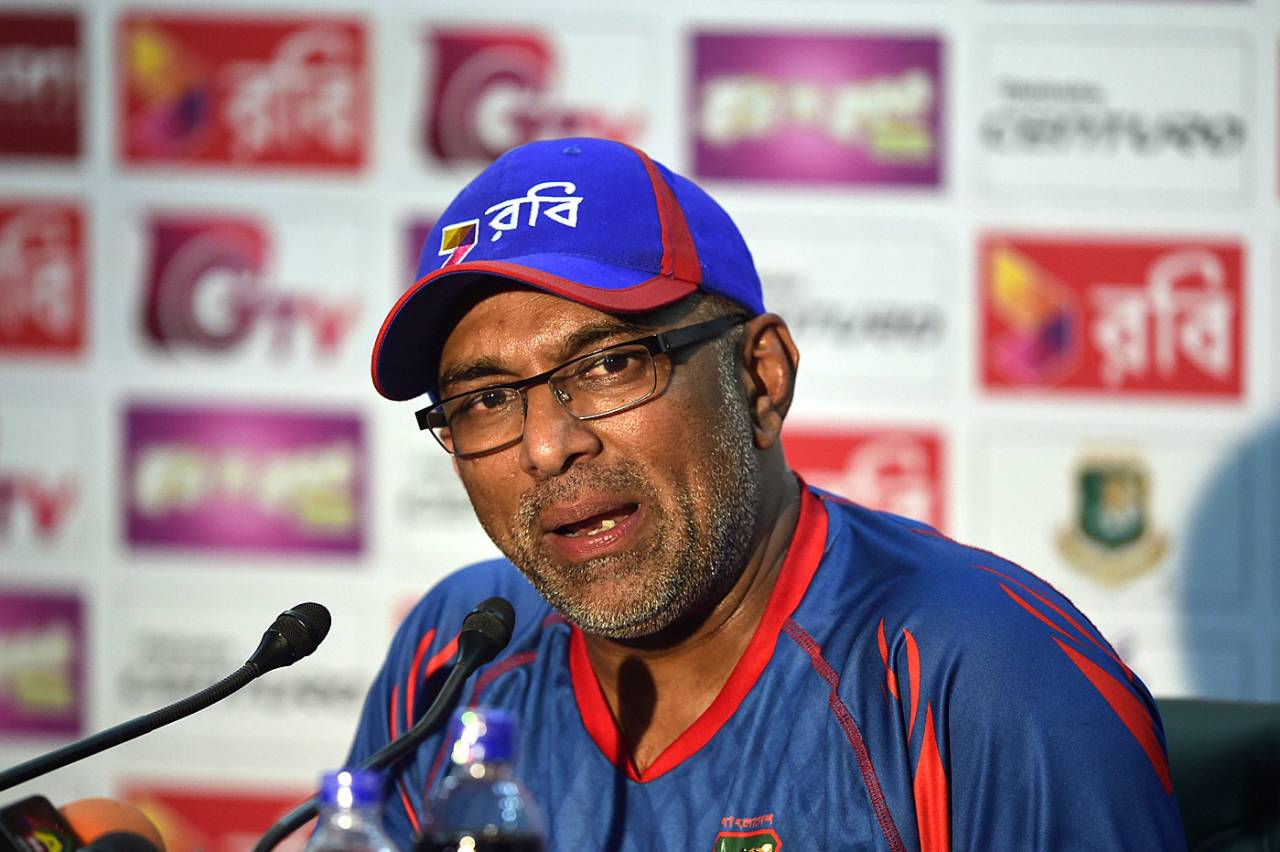Herath, Hathurusingha recall warm, shared history
Chandika Hathurusingha, once among Rangana Herath's fiercest supporters within the Sri Lankan system, will go up against his old pupil who is now his native country's Test captain
Andrew Fidel Fernando
05-Mar-2017

Chandika Hathurusingha and Rangana Herath spoke respectfully of each other's abilities ahead of the series • AFP
Rangana Herath, not far from starting his 40th year, finds himself in charge of his nation's Test team, a rising opposition on their shores, a major personal milestone in tantalising sight. Chandika Hathurusingha, almost a decade older, finds himself coaching against the country of his birth, the team centenary on the horizon, an overseas win unlikely but far from impossible.
Both men have known what it is like to be marginalised by their nation's cricket establishment. They have each been besieged by self-serving administration; they have experienced the frustrations of being sidelined unfairly. In recent years, they have also known the satisfaction of quietly sticking it to their skeptics. That is a journey they had partially walked together.
The relationship had begun normally enough in the late 1990s, when Herath began to dip his toes into the world of professional cricket, and Hathurusingha was making his first forays into coaching. Herath came to a trial at Moors Sports Club, where Hathurusingha had just become captain-coach. Hathurusingha was impressed enough by Herath's bowling to sign him on, but crucially, began to see in Herath the virtues that define the bowler he has now become.
"I always knew Rangana had the potential, because he has the patience and he's very clever - the way he understands situations," Hathurusingha says. "That's not something you can coach."
Herath remembers the earfuls he got from his captain-coach in those early years, but also the qualities that have gone on to define Hathurusingha's coaching career. "From the coaching side, he identifies players very well, and treats each individual according to their personality," Herath says. "At times he has been harsh on me. But his ability to understand players is his biggest strength."
Soon enough, a productive working relationship had developed. Hathurusingha increasingly began to see Herath as a player in whom he could trust. Herath began to feel he was working with someone with whom he saw eye to eye.

"He told anyone that would listen that I could really play"•AFP
"It was always clear for me what Hathu expected of me, and I found I could respond well to what he told me," Herath says. "I got results doing what he told me. Our thinking process was the same, and when that happens, it can be a very successful partnership."
Through the mid-2000s, while Sri Lanka's selectors saw in Herath a humdrum left-arm spinner, it was Hathurusingha who called for Herath to be picked for Tests. "The fact that I knew I always had his trust was a big source of strength for me," Herath says. "He told anyone that would listen that I could really play."
Hathurusingha remembers the three specific occasions he brought Herath into the limelight.
"When he was playing with me at Moors, he played Test cricket. When I became Sri Lanka A team coach and he was dropped from the national team, I made sure he was in my team. Again, in 2009, when there was an injury in the Test squad, we had to call him and get him back from England. I was involved in all three decisions, so in that sense, I'm proud that I backed him."
And how that support has been vindicated. Hathurusingha has been repeatedly spurned by Sri Lanka Cricket since his sacking in 2010, but in a six-year exile he has seen his star student become one of Sri Lanka's greatest Test match-winners. With 357 Test scalps, Herath stands six short now of eclipsing Daniel Vettori's tally to become the most successful left-arm spinner in history.
"It's a huge thing when you back someone without seeing what's going to happen, and to be honest he has gone on to achieve bigger things than I have expected," Hathurusingha says. "He's so clever in the way he reads what batsmen are doing. We still talk frequently. For example, we had a chat one series when he had just played against England. He said: 'I only turned three balls in the series, and they kept getting out to me - I got 18 wickets'. A lot of those were lbws. He pitched the ball in the same place against Jonathan Trott in two different games - one ball turned and the other didn't, and he got him out both times. I'm very pleased with what he's achieved."
Herath is not short of admiration for Hathurusingha either. "Bangladesh have a big advantage because a coach of Hathu's calbre is with them," he says. Hathurusingha, though, feels there is no clear edge to be had.
"Rangana knows as much about me as I do about him. We have shared his thinking and he knows my thinking as well. Even when I was away from Sri Lanka over the last six years, very frequently we speak."
In the approach to what promises to be a tight contest, there has been no hint of a niggle between the sides. No envenomed darts have been shot at press conferences. No one has made high-flying boasts. Why should there be bad blood, when between home captain and opposition coach, there is so much shared history, and such abiding warmth?
Andrew Fidel Fernando is ESPNcricinfo's Sri Lanka correspondent. @andrewffernando